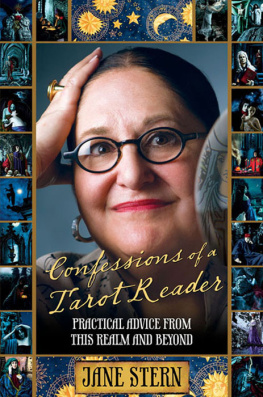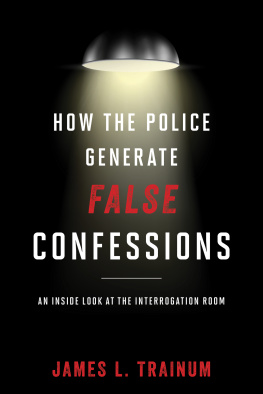Anne Fadiman - Ex libris: confessions of a common reader
Here you can read online Anne Fadiman - Ex libris: confessions of a common reader full text of the book (entire story) in english for free. Download pdf and epub, get meaning, cover and reviews about this ebook. year: 2000, publisher: Farrar, Straus and Giroux, genre: Detective and thriller. Description of the work, (preface) as well as reviews are available. Best literature library LitArk.com created for fans of good reading and offers a wide selection of genres:
Romance novel
Science fiction
Adventure
Detective
Science
History
Home and family
Prose
Art
Politics
Computer
Non-fiction
Religion
Business
Children
Humor
Choose a favorite category and find really read worthwhile books. Enjoy immersion in the world of imagination, feel the emotions of the characters or learn something new for yourself, make an fascinating discovery.
- Book:Ex libris: confessions of a common reader
- Author:
- Publisher:Farrar, Straus and Giroux
- Genre:
- Year:2000
- Rating:4 / 5
- Favourites:Add to favourites
- Your mark:
- 80
- 1
- 2
- 3
- 4
- 5
Ex libris: confessions of a common reader: summary, description and annotation
We offer to read an annotation, description, summary or preface (depends on what the author of the book "Ex libris: confessions of a common reader" wrote himself). If you haven't found the necessary information about the book — write in the comments, we will try to find it.
Anne Fadiman: author's other books
Who wrote Ex libris: confessions of a common reader? Find out the surname, the name of the author of the book and a list of all author's works by series.
Ex libris: confessions of a common reader — read online for free the complete book (whole text) full work
Below is the text of the book, divided by pages. System saving the place of the last page read, allows you to conveniently read the book "Ex libris: confessions of a common reader" online for free, without having to search again every time where you left off. Put a bookmark, and you can go to the page where you finished reading at any time.
Font size:
Interval:
Bookmark:
1. Ecclesiastes 1:9: "The thing that hath been, it is that which shall be ... and there is no new thing under the sun." Cf. Jean de La Bruyre, Les Caractres (1688): "We come too late to say anything which has not been said already." La Bruyre probably stole his line from Robert Burton's Anatomy of Melancholy (1621): "We can say nothing but what hath been said." Burton probably stole his line from Terence's Eunuchus (161 B.C. ): "Nothing is said that has not been said before." I stole the idea of comparing these four lines from a footnote in Bartletts Familiar Quotations.
2. Actually, I've never eaten anything Dan Okrent has cooked, but my friend Kathy Holub went to a dinner party at his home in 1994 and gave the pork loin high marks. I later found out that it had been cooked by Dan's wife, Becky. However, several people have assured me that Dan could have cooked it.
3. Macbeth (1606) 1.7.59.
4. The anecdote was stolen from Dan Okrent on October 31, 1996. The idea of using it in the first paragraph of this essay was stolen from my husband, George, who conceived it on November 11, 1996, while he was filling a Tupperware bowl with leftover spaghetti. The spaghetti recipe was from Irma S. Rombauer and Marion Rombauer Becker's Joy of Cooking (1972), with emendations by George's mother.
5. I stole this line from Dan Okrent. However, I made it mine by changing "teaspoon" to "sprig."
6. Isaiah 65:5: "I am holier than thou."
7. I burglarized Disraeli's quote from the intellect of Thomas Mallon (Stolen Words, 1989). As both Mallon and Alexander Lindey (Plagiarism and Originality, 1952) note, Disraeli's highmindedness might have rung truer had he himself not plagiarized his funeral oration for the Duke of Wellington from Louis Adolphe Thiers's funeral oration for General Saint-Cyr.
8. The Tempest (1611-12), 1.2.394.
9. Neal Bowers, "A Loss for Words," The American Scholar (Autumn 1994). David Jones is not named in this article; he is referred to merely as "my plagiarist," which strikes me as having a peculiar ring of proprietary intimacy, on the order of "my secretary" or "my podiatrist." Jones is identified in Bowers's book, Words for the Taking (1997).
10. Wallace Stevens, "The Motive for Metaphor" (1947), line 17. I think, though I'm not sure, that Stevens was talking about the temper of steel rather than of human beings, but one of the convenient things about pilfering someone else's words is that you don't have to worry about their original meaning.
11. Bowers, "A Loss for Words."
12. Ibid.
13. Henry IV, Part I (1596-97), 3.1.43.
14. I plucked this pearl from Lindey, op. cit., and upgraded it by adding the phrase "sticky fingers," which I found in Rogets Thesaurus under the heading "Theft."
15. Lindey said something similar about Shakespeare and the poets he plagiarized.
16. Lindey, op. cit.
17. I swiped these examples from Lindey, op. cit., because I needed to. The arithmetic was done by the eighteenth-century British scholar Edmond Malone.
18. Lindey notes that he borrowed his evidence from Voltaire.
19. Thomas Mallon, op. cit., and Lindey, op. cit. Mallon and Lindey both note that among the passages Sterne plagiarized from Burton was a vehement denunciation of plagiarism. According to Mallon, Sterne also plagiarized from himself. He thriftily recycled several love letters he had written to his wife and, years later, sent them to his mistress.
20. Peter Shaw, "Plagiary," The American Scholar (Summer 1992). Shaw notes that Poe damned plagiarism as "a sickening spectacle" and falsely accused other writers of committing it.
21. Mallon, op. cit., and Shaw, op. cit. Both cite Norman Fruman's 1971 study, Coleridge: The Damaged Archangel. (Fruman's title was taken from an 1816 letter from Charles Lamb to William Wordsworth.)
22. Walter Jackson Bate, Coleridge (1973), quoted in Mallon, op. cit.
23. I can't pinpoint the date, but I know it was a Thursday, because we were unloading the dishwasher just before watching E.R. I cite George as a witness in order to prove that although my idea turned out to be unoriginal, I truly believed I was the first to think it.
24. Alexander Lindey, Peter Shaw, K. R. St. Onge, and Thomas Mallon.
25. Cf. Robert Merton: "Anticipatory plagiarism occurs when someone steals your original idea and publishes it a hundred years before you were born." I am unable to provide a citation because my source is a yellow Post-it handed to me by my brother in Captiva, Florida, in November 1996.
26. Everything I've said about Biden is from Mallon, op. cit. Among Mallon's other examples of Chinese-box plagiarism is Jacob Epstein's plagiarism of a description of a character's balding head from a passage that Martin Amis had previously plagiarized from Dickens. Mallon also notes that the University of Oregon plagiarized the section on plagiarism in its student handbook from the section on plagiarism in Stanford's teaching-assistant handbook.
27. Cf. Alexander Pope, "Couplets on Wit" (1776), v: "Now wits gain praise by copying other wits / As one Hog lives on what another shits."
28. From a radio quiz show first aired in 1941. The reference was suggested by George on November 14, 1996, as he was doing his back exercises on our living room floor.
29. Cicero, De Officiis (44 B.C. ), 1.2.
30. This idea comes from Shaw, op. cit., and Harold Ogden White, Plagiarism and Imitation During the English Renaissance (1965).
31. Fielding, Tom Jones (1749), book 12, ch. 1.
32. Bowers, op. cit.
33. Charles Caleb Colton, Lacon (1820-22).
34. William H. Honan, "Hersey Apologizes to a Writer over an Article on Agee," The New York Times (July 22, 1988).
35. Annalee Jacoby Fadiman, conversation with author, November 4, 1996.
36. John Hersey, Men on Bataan (1942).
37. Laurence Bergreen, conversation with author, summer 1988. We talked again on November 5, 1996.
38. Ira Gershwin, "They Can't Take That Away from Me," Shall We Dance (1937).
Also by Anne Fadiman
The Spirit Catches You and You Fall Down

The essays in this book appeared, in slightly different form, in Civilization magazine.
For Clifton Fadiman
and Annalee Jacoby Fadiman,
who built my ancestral castles

 C ONTENTS
C ONTENTS 
 P R E F A C E
P R E F A C E
W hen the Irish novelist John McGahern was a child, his sisters unlaced and removed one of his shoes while he was reading. He did not stir. They placed a straw hat on his head. No response. Only when they took away the wooden chair on which he was sitting did he, as he puts it, "wake out of the book."
"Wake" is just the right verb, because there is a certain kind of child who awakens from a book as from an abyssal sleep, swimming heavily up through layers of consciousness toward a reality that seems less real than the dream-state that has been left behind. I was such a child. Later, as a teenager under the influence of Hardy, I could not fall in love without classifying the boy as a Damon or a Clym. Later still, I lay with my husband (a Clym) in a bed that was lumpy with books, hoping the delivery of our first child would resemble Kitty's birth scene in
Next pageFont size:
Interval:
Bookmark:
Similar books «Ex libris: confessions of a common reader»
Look at similar books to Ex libris: confessions of a common reader. We have selected literature similar in name and meaning in the hope of providing readers with more options to find new, interesting, not yet read works.
Discussion, reviews of the book Ex libris: confessions of a common reader and just readers' own opinions. Leave your comments, write what you think about the work, its meaning or the main characters. Specify what exactly you liked and what you didn't like, and why you think so.











